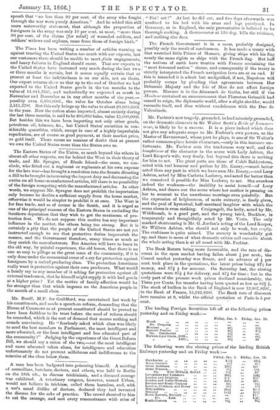The Eastern States of the Union, so much beyond the
others in almost all other respects, are far behind the West in their theory of trade, and Mr. Sprague, of Rhode Island—the same, we con- clude, who fitted out a regiment or regiments at his own expense for the late war—has brought a resolution into the Senate directing -a Bill to bebrought in increasing the import duty and decreasing the excise on all home-manufactured articles, till there is no possibility ef the foreign competing with the manufactured articles. In other words, we suppose Mr. Sprague does not prohibit the importation enly because he doubts a sufficient supply from the home market, -otherwise it would be simpler to prohibit it at once. The West is for free trade, and so of course is the South, and it is urged as -one of the principal reasons of the Eastern States in excluding the Southern deputation that they wish to get the maximum of pro- tection first. We do not suppose this motive has any important influence in the matter, the others being too strong. But it is certainly a pity that the people of the United States are not yet instructed enough to see that protective duties impoverish the masses, and the Government therefore, many times as much as they enrich the manufacturers. But America will have to learn in the old way, by painful experience, the old lesson, that there is no ene so easy to pillage as the great mass of the community, if it is only done under the economical cover of a cry for protection against foreigners by a united producing class. The protection Americans really want is protection against their own producers. What would a family say to any member of it asking for protection against all external tradesmen, that he himself might supply it with bad goods at a higher price ? Yet the motive of family affection would be far stronger than that which imposes on the American people in the mouth of a small class.






























 Previous page
Previous page